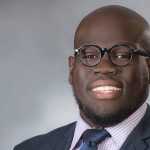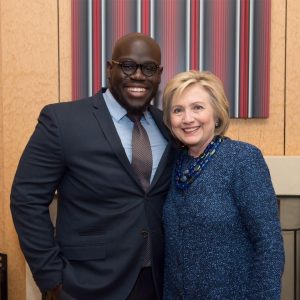
After the election results are finalized and the Champagne bottles are recycled, the Clinton campaign’s transition team will accelerate immediately. Every donor, public official, political thinker, and surrogate will be jockeying for senior positions, and favors will start being called in. But awaiting our next president is a divided American electorate whose collective trust in government has cratered.
Even as I filled in the bubbles beside the names of the candidates listed on my ballot, I had already disabused myself of the aspiration that any collection of political leaders could unify our country. According to Pew Research, in 1994, 17% of Republicans viewed Democrats as “very unfavorable.” Today, 43% of Republicans view Democrats very unfavorably. Likewise, in 1994 16% of Democrats viewed the GOP very unfavorably whereas today that number has ballooned to 38%. As I belabored over US Senate candidates in my home state, Oklahoma, I found myself wondering if I am part of the paltry 6% in a recent Gallup poll of Americans who still have “quite a lot” of faith in Congress. In addition to enacting whichever substantive policies will define the first 100 days of the next administration, mending the public’s dismal perception of government will should be the first task of the next president.
But now that she has won, what substantive policies should President-Elect Clinton and her transition team prioritize for their first 100 days in office? In short, she will have to determine how to expend her political capital on enacting policies that are unifying, substantive, and not mired in complicated nuance. This balance is tricky, but it provides the frame for how I will briefly discuss next steps.
President-Elect Clinton should begin her first 100 days focusing on immigration reform. As a signal of her bipartisan interest, she should appoint well-known Republicans as czars and give them the authority of key deal-makers. The quick political wins that come with positioning Republicans as intransigent will undoubtedly be alluring – particularly after such a drawn-out and acrimonious campaign. But if she hopes to repair the reputation of American political institutions, she needs to structurally position Republicans as partners in this work.
Once the inter-personal structure is in place, there are many reasons why  Republicans would want to embrace immigration reform. As an African-American man with deep strong ties in my community, I would often wonder why my innate support of Democrats persists even when I may not like the candidate. Of course, a lot of the lineage traces back to President Franklin Roosevelt’s New Deal, and the beacon it offered for blacks during the Great Depression. But it was not until 1964 and Republican Presidential Candidate Barry Goldwater’s denouncement of civil rights that support among blacks shifted majorly to the Democratic Party. If Republicans are not careful, opposition to comprehensive immigration reform could become their Goldwater moment.
Republicans would want to embrace immigration reform. As an African-American man with deep strong ties in my community, I would often wonder why my innate support of Democrats persists even when I may not like the candidate. Of course, a lot of the lineage traces back to President Franklin Roosevelt’s New Deal, and the beacon it offered for blacks during the Great Depression. But it was not until 1964 and Republican Presidential Candidate Barry Goldwater’s denouncement of civil rights that support among blacks shifted majorly to the Democratic Party. If Republicans are not careful, opposition to comprehensive immigration reform could become their Goldwater moment.
Attitudes about immigration reform now favor a pathway for undocumented immigrants to stay in this country, with 72% of Americans in support, according to Pew Research. In that same poll from Pew, 56% of Republicans expressed interest in a pathway for undocumented immigrants to stay in the US. With increases in the Hispanic population, waning support for Republicans among Hispanics could spell trouble for Republicans for quite some time. In 2004, George W. Bush won 44% of the Hispanic vote. In the run up to Election Day, the most recent Washington Post-Univision poll showed that Trump only had 19% support from Hispanics. To win this key voting demographic for future campaigns in future generations, both parties should race to champion this effort.
 Next, Clinton should work to enact universal pre-school (pre-k), which she has championed throughout her career. Research has demonstrated that every $1 spent on early childhood education (especially among lower-income families) returns $8 to the public. Public opinion is now catching up as seen in a recent Gallup poll—59% of Americans support free universal pre-K. Even more, historically conservative areas like my home state of Oklahoma have championed and implemented universal pre-K providing gains. According to studies published in Science and Policy Studies Journal, recipients of pre-K services in Oklahoma leapt an average of five months ahead in early numeracy and nine months ahead in early literacy skills. Parents, conservative and liberal, want these sorts of gains for their children. As the cost of child care increases, such a policy will be an easy win for the President-Elect and her Republican colleagues, helping both appeal to low and middle-income families, and signaling strong interest in reinvesting in American families.
Next, Clinton should work to enact universal pre-school (pre-k), which she has championed throughout her career. Research has demonstrated that every $1 spent on early childhood education (especially among lower-income families) returns $8 to the public. Public opinion is now catching up as seen in a recent Gallup poll—59% of Americans support free universal pre-K. Even more, historically conservative areas like my home state of Oklahoma have championed and implemented universal pre-K providing gains. According to studies published in Science and Policy Studies Journal, recipients of pre-K services in Oklahoma leapt an average of five months ahead in early numeracy and nine months ahead in early literacy skills. Parents, conservative and liberal, want these sorts of gains for their children. As the cost of child care increases, such a policy will be an easy win for the President-Elect and her Republican colleagues, helping both appeal to low and middle-income families, and signaling strong interest in reinvesting in American families.
Issues that Clinton should avoid include climate change, gun control, and foreign policy issues like trade. This is not for want of impact. If Clinton champions climate change she will be at the forefront of what will arguably be the single most critical issue our time with vast intergenerational consequences. Admittedly, I personally wish that these three issues could be listed among her top policy priorities. However, according to recent Pew Research Poll, 56% of Clinton supporters “care a great deal” about issues of climate change, while only 15% of Trump supporters feel the same. Like the Affordable Care Act, each one of these issues if resolved could pay significant dividends for the American public, but will come at the costs of deepening the political divide. Clinton needs to decide if she is willing to invest the lion share of her political capital on impactful legislation that will undoubtedly have divisive political outcomes. Climate change policies, like gun control or trade, might change the world—I would argue for the better—but it will not, in the short term, do much to bridge the divisive gap in America. In contrast, universal pre-k and immigration reform will deliver opportunities for bipartisan engagement and reinvestment in advancing those too often left behind.
While these considerations might maximize opportunities for healing, President-Elect Clinton will face a host of consequential decisions that are wrought with controversy. For instance, if Republicans do not allow a vote on Judge Merrick Garland during President Obama’s lame duck session, Clinton will have to decide whether to keep Judge Garland as her supreme court pick or choose a new nominee. The Trans Pacific Partnership stands at the center of hotly contested political debate and Clinton has supported it but now opposes it. Given the attention paid to this issue on the campaign, Clinton will need to find a way to rework or replace the TPP. These are just two policy issues with deep political discord. Like any other president, she needs determine in which policies she will invest her political capital. She needs to pick policies based on feasibility and opportunity for shared bipartisan wins, because America does not have the confidence that government can function.
—————————————-
Caleb Gayle(HBS & HKS ’19) is an Oklahoma Native and a joint degree student at Harvard Business School and Harvard Kennedy School, where he attends as a Sheila C. Johnson Fellow at the Center for Public Leadership. Prior to Harvard, Caleb worked as a Program Officer at the George Kaiser Family.



